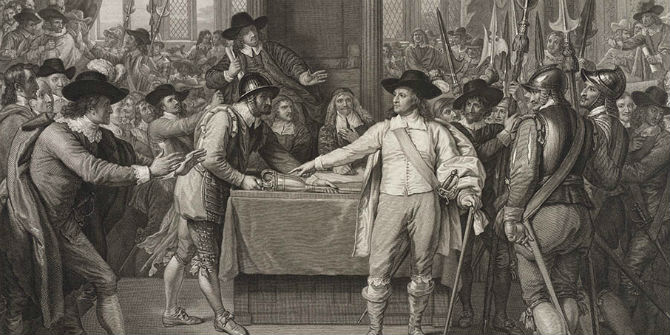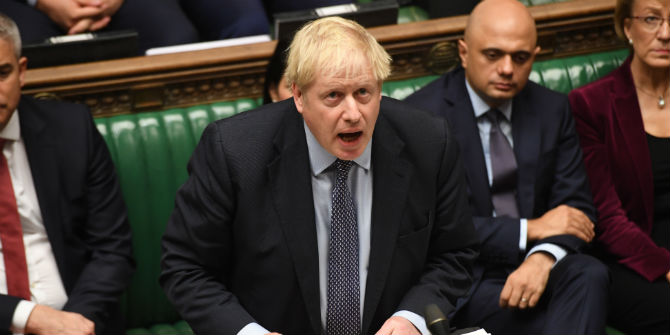 The Johnson-Cummings disdain of Parliament echoes Oliver Cromwell’s struggles with the institution. Brendan O’Duffy (Queen Mary University of London) discusses how Cromwell’s second tenure as Lord Protector tried to establish an ‘Anglo-British’ nation that bears a resemblance to the vision espoused by hard Brexiters.
The Johnson-Cummings disdain of Parliament echoes Oliver Cromwell’s struggles with the institution. Brendan O’Duffy (Queen Mary University of London) discusses how Cromwell’s second tenure as Lord Protector tried to establish an ‘Anglo-British’ nation that bears a resemblance to the vision espoused by hard Brexiters.
In his admiring review of Graham Allison’s Destined for War, Dominic Cummings discussed the logic of the ‘Thucydides trap’. Thucydides famously said of the Peloponnesian wars that ‘fear was our principal motive, though honour and interest came afterwards” and that that conflicts between ascending and descending states are bound to be warlike, due to the breakdown of the ‘common law’ regulating relations between an alliance.

For Cummings, the strategic implication appears to be that the European Union is a declining ‘liberal empire’, with Germany and France unable or unwilling to coerce weaker states into a stronger union. Within the hard Brexit rump of the Conservative party, both the ‘sovereign individualists’ (who want, like Jacob Rees-Mogg and his father, to liberate individual wealth from failing states) and the rationalist statecrafters (Cummings) coalesce. They believe a hard Brexit constituency within the electorate can be harnessed through a mixture of fear (of a Corbyn government), honour (restored pride vis-à-vis Europe) and interest (of financial services).
A variant of this projection is shared by social democratic academics like Wolfgang Streeck and Yanis Varoufakis. Jeremy Corbyn also appears to share the view that the European ‘liberal empire’, based on soft power, has become captured by markets and is losing its ability to shape events in the face of combined climatic, fiscal and human (refugee) crises, and the deepening ‘democratic deficit’. These predictions of imminent decline are consistent with the attraction of Brexit to both the hard left and right sections of the UK polity. They also belie the evidence of the EU’s capacity as the only inter-governmental entity that can regulate, however irregularly, the tech, pharmaceutical and finance behemoths, and its relative success in handling the Syrian, fiscal and Brexit crises since 2008.
Cummings seems to believe that the crisis he identifies can only be managed by credibly threatening to reduce the nation state’s involvement in federalising (or devolving) projects. The implication is that, just as Prussia dared weaker states to ally or contend with other continental powers (Austria, France, Russia), even after a hard Brexit Scotland, Northern Ireland and even the Republic of Ireland will prefer integration into the newly consolidating centre of power: Anglo-Britain, its ‘Atlantic bridges’ and visions of the Singapore model, which will offer preferential immigration terms to (predominantly white) former colonials.
The latest proposal for not one but two borders with Ireland was the clearest indication yet that Boris Johnson and Cummings hope for a breakdown of talks with the EU to drive a domestic electoral campaign based on restored national self-determination and demonisation of the EU.
Recent attempts to draw parallels between Cummings and Johnson and Oliver Cromwell tend to focus on the first constitutional crisis and the forceful dissolution of the Rump Parliament by Cromwell’s New Model Army. However, for Cummings, a perhaps more sobering historical reference than Thucydides or Oliver Cromwell’s first tenure is his second as ‘Lord Protector’.
Three aspects of the ‘First and Second Parliaments of the Protectorate’ are worth noting for their contemporary resonance and their historically constitutive effects on British constitutionalism and sovereignty. Firstly, the principle of popular consent, founded on ‘national’ conceptions of legitimacy was established during and after the English Civil War (1642-51).
When Cromwell assembled his ‘Parliament of Saints’ in July 1653, it became the first explicitly national assembly by including a fixed, though disproportionate, quota of members from England, Scotland and Ireland. This could be taken as an expression of a new principle of national legitimacy (i.e. vesting state legitimacy in national consent to be governed).
Scholars of nationalism dispute the extent to which anything like ‘national consciousness’ existed or was politically relevant beyond the elite – though evidence suggests it certainly existed among broad ranges of Irish Catholic confederates in the 1640s as much as Scottish Covenanters or English Puritans. According to the constitutional historian J R Tanner, the conception of nations unifying under the same (Puritan) God ‘turned the tide’ away from divine monarchy towards what scholars would classify today as quasi-republican (non-secular but liberal-national) as the basis of state legitimacy.
However, then as now, some nations were more equal than others. While Cromwell’s contemporaries described the polity as a composite of the ‘three nations’, ultimate sovereignty was based on a singular, composite conception of the ‘Anglo-British’ nation. If, for Cromwell, ‘out of native perversity they failed to do these things [‘express the will of the people’; reject royalism, papacy, accept the principle of toleration .. choose and establish the rule of godly men] it was the duty of the army to control their political appetites for their own good’ (Tanner, 1966: 170).
The tension between national state legitimacy and the hierarchical conception of legitimate nations undermined Cromwell’s short-lived attempt to shift from pragmatic to ‘idealistic’ (in a European constitutional legal sense) constitutionalism. Cromwell’s approach, as Tanner emphasised, ‘divided between two inconsistent principles – the rule of the godly and the sovereignty of the peoples’.
Swap godly for ‘establishment/elites’ and the history is resonant. All the constitutional crises of the past two centuries have centred on the power struggle between the English-dominated Westminster parliament and Scottish or Irish status within the Union (1707; 1800; 1829; 1848; 1867-92; 1911-1921; 1973; 1993). In most of them nationalists (O’Connell; Parnell; Redmond) and unionists (Carson, Craig(avon), O’Neill, Faulkner, West, Molyneaux, Trimble, Foster in Ireland/Northern Ireland) have held an actual or effective veto on legislation involving constitutional change. So much for strong and stable.
Cromwell’s first attempt to locate sovereignty in the ‘Crown in Parliament’, represented, then as now, the need to balance the foundational authority of the ancient, monarchic constitution with early demands for forms of ‘popular’ representation via Parliament.
In arguing for the need to restrain Parliament in 1653, Marchamont Nedham claimed ‘that some power should pass a decree upon the wavering humours of the people, and say, to this nation, as the Almighty Himself said once to the unruly sea: ‘Here shall be thy bounds; hitherto thou come and no further’. This argument failed to secure a Parliamentary majority.
Cromwell strained constitutional authority to purge opponents on grounds of disloyalty to government. When told his decree dissolving the first of the ‘triennial’ parliaments was ‘against the will of the nation’, Cromwell replied: ‘Very well, but what if I should disarm the nine, and put a sword in the tenth man’s hands? Would that not do the business?’
Reneging on a commitment to rescind the executive’s authority to dissolve (prorogue) Parliament, Cromwell duly purged the second Parliament of the Protectorate, famously willing ‘God be Judge between you and me’. British gods judged him guilty and restored symbolic monarchy and substantive republicanism (rule of law, parliamentary supremacy), though in a form whose fusion of executive (government) and parliamentary power was itself vulnerable to a lurch back to monarchic prerogative.
The third implication for understanding the broader trajectory of British-Irish relations is that power achieved through force is tenuous compared to that emanating from constitutional processes based on consent of the governed. The success of the Good Friday Agreement, an elaborate institutionalised power-sharing system addressing British-Irish, Northern Irish and North-South European dimensions, has been demonstrably more successful than all of the previous British (and Irish) conflict regulation approaches based on unitary notions of sovereignty, majoritarian government and exclusion of militants (‘terrorists’).
Optimistically, the Supreme Court’s unanimous verdict that the Johnson government had acted illegally in advising the monarch to prorogue parliament may be the tipping point towards Cummings’ and Johnson’s fall. It would demonstrate the resilience of the constitutionalism in the face of executive (cloaked as monarchic) prerogative.
This post represents the views of the author and not those of the Brexit blog, nor LSE.
Brendan O’Duffy is a Senior Lecturer in Politics at Queen Mary University of London and the author of British-Irish Relations and Northern Ireland: From Violent Politics to Conflict Regulation (Irish Academic Press, 2007). He obtained his PhD in Government from LSE.







Goodness! I was beginning to think how much Jeremy Corbyn reminds me of Cromwell., not Boris.who is far too swashbuckling .I doubt if JC is fond of our monarchy. I think he would rather replace it with some polit bureau system.. If anyone could ban Christmas he would.Probably on the grounds of it being a capitalist plot.even though there may be a bit of truth in that.For goodness sake lighten up. We are not at war with anyone .Brexit is about finding a new relationship with the EU .There a lot of back issues like the need to rebalance our economy away from London so facilitated by being part of the EU.. I’m glad for Labour, I’m glad for the Conservatives and eveyone else. The ralttlement caused by Brexit is long overdur. I think that in the end everything will be allright..